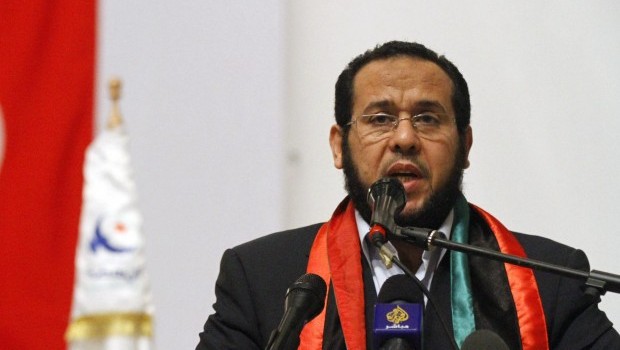
Abdul Hakim Belhadj of Libya’s Homeland party speaks during a demonstration at the Ennahda party “Youth Festival” organized by the Renaissance Movement at the Conference Palace in Tunis December 23, 2012. (REUTERS/Anis Mili)
Tripoli, Asharq Al-Awsat—Abdelhakim Belhadj, former head of the Tripoli Military Council, has claimed that a controversial draft political exclusion law does not target any Libyan in particular. During a telephone interview with Asharq Al-Awsat, Belhadj called for national reconciliation, observing human rights, and securing the objectives of the 17 February 2011 revolution. He stated that the political exclusion bill, which would prevent individuals who worked in Colonel Muammar Gaddafi’s regime from entering politics, “…would have negative impacts if it targeted a particular person.”
Observers say that the political problems of North Africa’s foremost oil exporting country were further complicated by the Islamists’ efforts to marginalize Mahmoud Jibril, Libyan politics’ rising star. Mr. Jibril was interim prime minister following the February revolution and this, the Islamists claim, subjects him to political exclusion in accordance with the new draft law. The controversy surrounding the issue further increased when the leaders of the Swehli group threw their support behind the bill as well.
However Mr. Jibril, who leads the National Forces Alliance (NFA), then submitted a paper to turn the tables. He proposed, by way of his allies in parliament, that political exclusion should extend to everyone who has worked with Gaddafi since 1969, which would effectively leave the current government and parliament leaderless.
Mr. Belhadj, currently the leader of Al-Watan Party, said, “Let me be clear…I do not think that the issue in parliament has anything to do with the adoption of the exclusion bill.”
Sources say that Mr Jibril’s opponents are looking to exploit the fact that he led an advisory panel to restructure the ministry of planning, and contributed to developing a new education strategy in 2006, during the reign of Gaddafi. However Mr. Belhadj denied the charges that the Islamists are targeting Mr. Jibril, saying, “No, this is not true. I believe that the proponents of the political exclusion law have toured many Libyan cities and spoken on the radio stating their opinions. They say they are not singling certain people out. They talk about securing the goals of the February 17 revolution and pursuing members of the former regime.
“I myself can say that this law would have negative impacts if it targeted a particular person. We are focused on realizing the human rights goals championed by the revolution, expediting social justice, and reconciling the nation. We strive for these things so that we may build the nation in accordance with the standards of the 17 February revolution.”
Mr. Belhadj wanted to publicly declare his opposition to exclusion and marginalization, saying, “We also want to send a message that we do not seek to exclude, marginalize, or adopt any other negative trait of that nature…Proponents of the draft law do not mention these things. I myself have heard that some of the strongest backers of this draft law are members of parliament, including Dr. Abdul Rahman Al-Swehli, who said that he would welcome this law even if it excluded him from politics.”
Abdelhakim Belhadj called on those accused of working with the former regime to distance themselves from leadership positions in government, saying, “I think it’s a subject that should be studied and discussed nationally. We should not pay any heed to accusations being made by one party against another as much as possible so as to protect the nation’s interests. In other words, to those who criticize the political exclusion law, I say to them that they should do the right thing and admit to being part of the former regime.”
Mr. Belhadj said that anyone who wants to serve the citizens can do so without necessarily occupying a parliamentary seat, saying, “If we want to build the country, everyone is able to give and contribute without necessarily being in power. Why do we feel that one needs a seat in parliament or ministry position in order to serve the homeland and advance the interests of the citizens?! We want to build our country after the revolution which gave everyone the opportunity to build a new Libya, God willing.”
In contrast, government sources said that if the draft law passes in its current form, it would mean that “the prime minister, his cabinet, the speaker of parliament, the deputy speaker, and a large number of MPs would be banned from politics, and thus the country’s only political elite would be excluded.” The sources added that after meetings in the corridors of parliament, the government decided to postpone the bill’s introduction indefinitely.
Several parties held a meeting in Tripoli to postpone the bill. A source who attended the meeting said, “Consensus was achieved and national division prevented.” Ibrahim Ameish, head of the National Democratic Alliance Party which is aligned with Mr. Jibril, told Asharq Al-Awsat that the whole issue of exclusion, “…was the result of stubbornness.” Mr. Ameish pointed out that the issue of exclusion is important, but that it, “…should not be conducted in this manner.”
The draft law includes many controversial points, including banning anyone who worked as an ambassador or minister under Gaddafi. Exceptions are made for those who pledged their allegiance to the revolution against Gadaffi. Some politicians, Ibrahim Ameish included among them, say that, “Exempting anyone who defected to the revolution would even apply to Ahmed Kaddaf El-Dem (Gaddafi’s special envoy, currently living in exile). Ameish added, “Going about the exclusion law in this manner will divide the country.”
